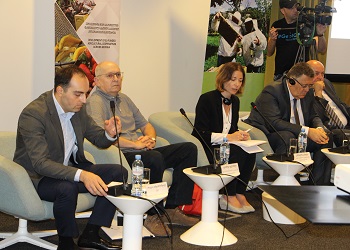On 14 July 2017, ENPARD implementing organisation CARE and its partner ISET Policy Institute (ISET-PI), in cooperation with other ENPARD implementing partners (Oxfam, Mercy Corps, People in Need and UNDP Adjara) presented the results of ENPARD Cooperatives Survey, which assesses the performance of EU-supported cooperatives for the period 2014-2016.
The results are based on the data collected by four ENPARD implementer consortia (led by CARE, Oxfam, Mercy Corps and People in Need) and UNDP Adjara, and analysed by ISET-PI. The fruitful cooperation among the ENPARD implementers is allowing this research and its public presentation.
Welcoming remarks were delivered by George Glonti, Mission Director, CARE International in the Caucasus, Cristina Casella, Agricultural Attaché, EU Delegation to Georgia, George Khanishvili, Deputy Minister of Agriculture of Georgia and Konstantin Khutsaidze, Deputy Head of Agricultural Cooperatives Development Agency. The survey results were presented by Irakli Kochlamazashvili, ISET Policy Institute (ISET-PI).
As of January 2017, EU had financed more than 260 cooperatives across the country. The ENPARD programme, through the implementer NGO consortia, has supported the cooperatives by purchasing assets (mainly fixed assets), providing intensive technical support via trainings and bringing experts to the site, as well as helping to build the market linkages for purchasing inputs or selling outputs.
Agricultural cooperative development is a long-term process. Therefore, the survey results will be more consistent after a few years. However, the current data has already allowed tracking the development of ENPARD-funded cooperatives and showing initial trends.
Overall, the cooperatives have shown positive development dynamic. Out of 254 surveyed cooperatives, 39% employed paid workers in 2016, compared to 36% in 2015. The development trend is also noticeable in the average value of fixed assets used by the cooperatives, which increased by 60% per cooperative in 2016 compared to 2015, and by 200% compared to 2014. Besides, most of the cooperatives, 76% of those surveyed, reported to reinvest the substantial share of profits into business development.
For cooperatives with the baseline year of 2014 (first-round 91 cooperatives in total) gross income increased by 64% on average per cooperative in 2016 compared to 2014, while the average net income (profit) increased by 30% in the same period.
The surveyed cooperatives are involved in about 23 different agricultural value chains and produce a huge variety of products. The production volumes of some products harvested by the ENPARD-supported cooperatives in 2016 mean 3.4% of Georgia’s total production of honey, 2.3% of (in-shell) hazelnuts, 1.9% of potato, 0.75% of maize and 0.4% of vegetables.
The study also shows that women are actively involved at all levels in agricultural cooperatives. In total, 37% of members and/or employees are women. Women also take leading managerial positions in cooperatives, out of all surveyed cooperatives 23% of management board members are women.
The EU is supporting agriculture and rural development in Georgia through its ENPARD Programme. Implemented since 2013 with a total budget of EUR 102 million, the main goal of ENPARD is to reduce rural poverty in Georgia. The first phase of ENPARD in Georgia focused on developing the potential of agriculture. The second phase of ENPARD focuses on creating economic opportunities for rural population that go beyond agricultural activities.
Presentations:
• ENPARD Annual Cooperative Survey Results – Irakli (Rati) Kochlamazashvili (in English)
• ENPARD Annual Cooperative Survey Results – Irakli (Rati) Kochlamazashvili (in Georgian)
• Development of Agricultural Cooperatives in Georgia with the support of EU-funded ENPARD Programme (in English)
• Development of Agricultural Cooperatives in Georgia with the support of EU-funded ENPARD Programme (in Georgian)















